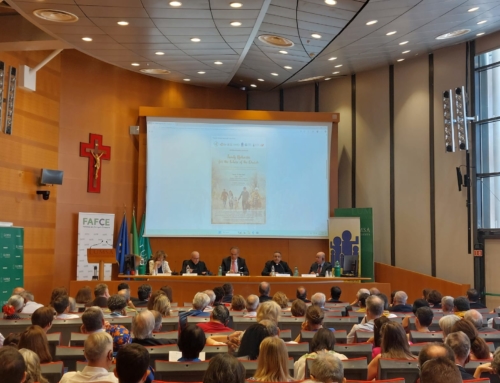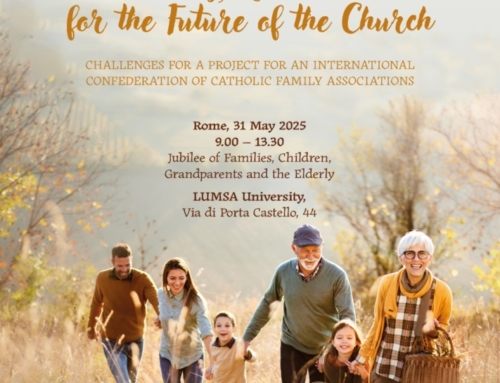On Thursday, May 13th, FAFCE hosted a webinar on the topic of “The Family: Antidote to Loneliness, Beyond the Pandemic”. The webinar engendered a lively discussion on the importance of the family as a force for cohesion, unity, and peace. Panelists from Europe and the Middle East spoke about the versatility of the family and about its unique capacity to satisfy people’s universal need for love, intimacy, and belonging. Valeria Guarino, the Secretary General of the Family International Monitor, moderated the event.
FAFCE’s President, Vincenzo Bassi, Ph.D., touched off the webinar by elaborating on FAFCE’s mission of promoting the establishment of family organisations. He put this aspect of FAFCE’s mission into the context of the ongoing COVID-19 pandemic, in which suffering and exclusion are proportional to loneliness, as evinced by the experiences of those people who had to live the time of pandemic and quarantine away from family and friends. Mr Bassi stated that “Loneliness is the real, pervasive pandemic of our times, one that has only been brought to light by the covid pandemic” and highlighted a dual separation: between individuals and families, and between families and their community. These separations intensify the experience of loneliness and demand immediate attention. According to Mr. Bassi, family associations constitute the best means of bridging these separations and weaving individuals and families into the fabric of their communities. As he said in conclusion, “We have a lot to learn from each other… I hope that the different interventions will shine a light onto these dimensions of the discussion. I also hope that this discussion will allow us to see how families build up the Church and our communities.”
Ms. Marcela Szymanski, EU Head of Office for Aid to the Church in Need, enlightened the audience about the plight of persecuted and struggling Christian communities around the world. Nonetheless, she maintained a hopeful tone rooted in her experiences of seeing God provide for these communities and witnessing the flowering of communities and cultures in unexpected circumstances. To crystallise her point about the unlikely zeal that pervades these communities, she shared a striking story “about Christ taking a family by surprise”. One Christmas, as a Palestinian family in Gaza, which has been governed by Hamas since 2007, sat down to dinner, the father made a surprising announcement. He had converted to Christianity, he said, and waited for Christmas to share his joy in his new faith, regardless of the danger of doing so and the difficulties such a decision might cause. As looked around at his family’s reactions, one of his daughters looked up and said “Me too”. Then his wife did the same. Then his second daughter. Then his third daughter. It turned out his three daughters and wife had all secretly converted as well. In an area where the punishment for conversion is at least 6 years of imprisonment, this father, his wife, and their three daughters found solace and acceptance. “They have not been rejected as they expected. In times of fear and persecution, and certainly loneliness, they all thought they were alone, but this was not the case”, Ms Szymanski summarized. Millions of experiences like this occur every day thanks to the unique intimacy of the family.
Maria Steen, representative of Family Solidarity Ireland, followed this moving intervention with an equally powerful critique of the increasingly utilitarian tendency in European culture and an affirmation of the invaluable role of children and families in reintroducing this culture to love. She noted that, as the average age of women becoming mothers for the first time increases, much of the resistance to marriage and starting a family stems from the fact that “Many young people have been affected by negative experiences of marriage within their own families.” Young people have to bear this emotional baggage in addition to an unrelenting societal denunciation of children as environmentally problematic. “But,” insisted Ms Steen, “children are good regardless of what the bean counters might say.” She continued to say that “Despite what the world tells us, it is marriage that is the linchpin of society, and marriage to which we should turn out attention. Family is the intimate living out of a life together… It needs a forever commitment at its core.”
Najwa & Nizar Halasah refocused the topic of the webinar around the Jordanian perspective. They presented the activities and history of an important family association operating in Jordan and throughout the world, known as the Equipes Notre Dame in French and Teams of Mary in English. “Equipes Notre Dame” began with the exhortation for couples to “nurture a faith in the all-powerful tender care of Our Lady and that every couple should experience the trust and security that little children feel in the presence of their mother”. They also shared their experience of having participated for many years in the Equipes Notre Dame—a commitment that includes meeting with several other couples for weekly prayers, monthly gatherings, and yearly retreats, among other activities—and the positive effect it had on their marriage and family life. Deacon Jubran Salameh, Responsible of Equipes Notre Dame, Jordan, finished the segment by pointing out that, in his experience as a spiritual advisor to couples engaged in the Equipes Notre Dame, the positive impact experienced by Najwa and Nizar
Kalman Daboczi, President of the 72 Disciples Movement presented the Hungarian perspective on the family and referred to his large family as “the best insurance for a Christian life!” He reiterated the need for families to bear witness to their faith as a means of evangelization and growing closer to others in the same faith.
Bishop William Shomali, Vicar for Jordan and Auxiliary Bishop of the Latin Patriarchate of Jerusalem, concluded the meeting by underlining the “Importance of family regarding loneliness. This problem existed with the first man, when “the Lord saw that Adam was sad because he was alone”. He highlighted the surge in suicides during the pandemic as proof of the ingrained human need for communion and intimacy. He also reflected on his own experience of recovering from COVID-19, during which he spent one month in a room by himself and communicated only by phone or through a closed door. He said this experience attuned him to the suffering of those for whom loneliness is a permanent condition and reaffirmed his conviction that the Church must reach out to the lonely however it can. His intervention also referenced the recent outbreak of violence in the Holy Land, which he tied back into the theme of the webinar. Just as Christian organisations are usually the ones that contribute to rebuilding areas damaged by violence and war, so too must Christian organisations rebuild the souls ravaged by loneliness.
In case you missed it, you can still watch our webinar on “The family: Antidote to Loneliness, Beyond the Pandemic” below!







